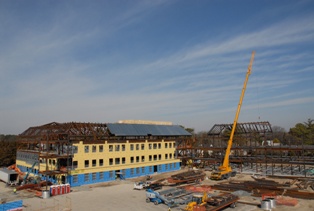Environmental Friendliness Part of Overall SU Plan

Bicycle racks were intentionally incorporated into the design to encourage bicycling as an alternative to driving. Some floors will be covered with renewable and recyclable bamboo instead of petroleum-based products. Up to 40 percent of the building’s structural steel frame is made from recycled materials, and an ultra-efficient heating, ventilation and air conditioning system will use no CFCs.
“Ayers Saint Gross Architects and Planners were creative and put a lot of time and energy into the design of our new building,” said Jeffrey Downes, SU director of facilities planning and capital projects. “They took great leadership in designing an environmentally friendly building.”
SU also worked closely with the University System of Maryland Service Center, which provides technical support for capital projects. “The university is implementing as many environmentally friendly and sustainable construction techniques as possible in all our building projects. The institution is not just thinking about, but has already moved aggressively toward consideration of environmental concerns in all of its operations,” said Greig Mitchell, vice president of administration and finance at SU.
Through a recent partnership with Pepco Energy Services (PES), Inc., SU is implementing similar environmentally friendly infrastructure changes in all campus buildings, decreasing everything from electricity to water usage for a projected $5.3 million savings.
PEPCO is providing services for 17 projects, including the replacement of aging mechanical equipment or the installation of more efficient equipment for heating and cooling in 14 buildings, the installation of tens of thousands of more energy-efficient bulbs and lighting fixtures and the installation of energy “misers” on vending machines.
The project also involves upgrading approximately 1,700 plumbing fixtures to conserve 11,000 gallons of water annually and reducing excessive air and solar infiltration to building interiors in 38 locations.
Funding for the project comes from the guaranteed savings through the investment, as well as from residence hall renovation funding. In all, the project is expected to save water equal to the amount consumed annually by 473 family homes, electricity sufficient to power 1,600 homes, and will reduce emissions equal to removing 1,571 cars from the road. Upon approving the idea in November, the Maryland Board of Public Works commended the University for its creativity and leadership in this area.
In addition, SU continues to promote such long-term eco-friendly solutions such as mass transit. By expanding the capacity and pickup locations of the University’s shuttle service this year, SU has increased ridership and decreased the number of individual vehicles on the road to campus each day, Mitchell said.
Partnerships also help: After hearing from SU officials, Wicomico County changed plans for a pedestrian sidewalk from University Park Apartments to Wal-Mart in Fruitland in favor of a bicycle path to encourage students to use non-motorized transportation.
For more information call 410-543-6030 or visit the SU Web site at www.salisbury.edu.
